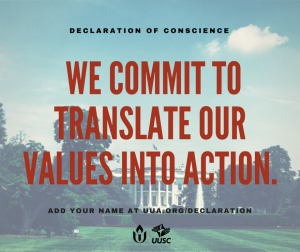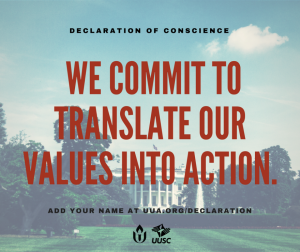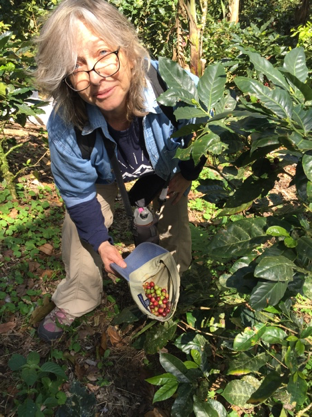
Beyond Fair Trade: Building Just Relationships
Jan Taddeo (writer) and JenJoy Royal (photographer) travelled with UUCSJ to Nicaragua in February 2017 for our Beyond Fair Trade: Building Just Relationships immersion journey. We partner with Equal Exchange for this journey to explore the power of fair trade to improve the lives of producers and help consumers live their values. To learn more about this journey or to register for our upcoming February 2018 journey visit www.uucsj.org/fairtrade
It’s been eight months since I journeyed to Nicaragua with the UU College of Social Justice. Every morning when I drink my coffee I am reminded of the many complexities associated with this journey. Nicaragua is a beautiful country, with a very complex historical relationship with the United States. The people we engaged with during our journey were warm and welcoming, and their lives are complex. The Equal Exchange coffee I drink each morning takes an intricate journey to arrive at my breakfast table.
The preparation for our journey to Nicaragua included several weeks of reading, learning, and reflecting about the history of the country, and the history of U.S. involvement in Central America. Not knowing this history prior to making the commitment, I was overwhelmed with the stories of our entanglement, interference, military involvement, and economic influence. I wasn’t quite sure how we would be received by the people. On one hand, Nicaraguans have many reasons to be wary, distrustful, and fearful of Americans. On the other hand, many U.S. citizens came to Nicaragua to support the people in their struggle. However, I need not have been concerned, we were met with great hospitality and trust.
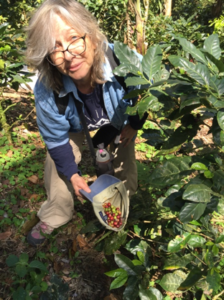
Jan Taddeo Picking Coffee Cherries
The greatest example of the trust placed in us showed up in our first meeting with the leadership of the farming cooperative in Quibuto. After engaging in an enthusiastic game of “All My Friends and Neighbors” (todos mis amigos y vecinos) to break the ice, the coop leaders gave a presentation about their needs and concerns as farmers. Their presentation included details of their costs, from planting the seeds to harvesting and processing the crops. This was followed by a breakdown of how much money they receive from the larger coop that buys the crops from the small farmers, how much that coop receives from Equal Exchange, and then their understanding of how much Equal Exchange makes on a pound of coffee. They explained the challenges they face in obtaining deeds for the land so they can plant more coffee, and the hardships of weather, blight, and infestations that can wipe out crops that take three years to mature.
Representatives in attendance from Equal Exchange were able to engage in a deep conversation about all of the forces that impact the creation and distribution of coffee. It was a difficult and fascinating conversation to hear, even when everyone was speaking the same language. We were able to ask questions which led to more conversation and it was an honor to be invited in and trusted. We learned that even though this is a fair-trade relationship between Equal Exchange and this small farming cooperative, it is still a difficult life, in part because coffee is a complex crop.
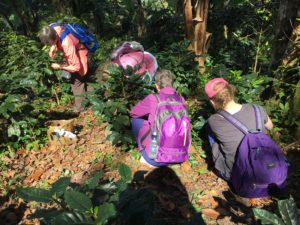
The group hard at working harvesting coffee
I never thought too much about what a coffee plant looks like, how it grows, or how we get coffee from it. On this journey we followed the trail from coffee seed to coffee bean to coffee tasting. We drove by fields of coffee bushes devastated by rust. We saw seedlings that were just a few months old and learned that they will not produce fruit for three years. We climbed the side of the mountainous landscape to reach the coffee bushes living under the shade of giant eucalyptus trees (did you know coffee grew on bushes?). We were taught how to tell when the coffee cherries are ripe and had the opportunity to harvest them. It’s much harder than it looks!
Back at one of the homes in the village, we helped unload giant bags of coffee cherries, dumped them into a bin that was attached to a depulper, and ran the cherries through it. We assisted in washing the naked beans, gently swishing them in the trough with a large paddle to allow the good beans to float to the top and the unripe beans and debris to sink to the bottom. Then we took buckets of beans up to the large drying racks in the front yard. There the farmers would carefully sort through the beans, separating the top quality beans from the lower quality beans. The best beans are the ones that move forward to the next level of processing at the larger coop, which then ships the beans all over the world. In touring that facility on our way out of the village, we also got to visit the tasting room! Yum!
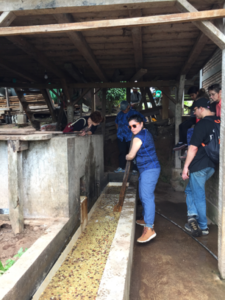
Coffee sorting
The coffee we drink that comes from Nicaragua, and from many other countries, has a complicated history with the land, and a complex life from seedling to the cup of steaming coffee on the breakfast table. The people who grow the coffee work harder than I ever imagined, and they lead humble lives compared to mine.
We stayed three days in Quibuto, living with the families, getting to know their children, grieving with them when the sudden death of young man shocked the community, and being entertained by them at a big community party on our last evening together. We discussed a wide range of topics with the people we stayed with, depending on our language skills. Some heard their stories from the revolution, or enjoyed deep theological conversations. Not knowing Spanish, I got to know my family through dancing with them to the rock music their 17-year-old nephew put on the radio. I brought color pencils and paper, and the children and teens drew beautiful pictures for me. I managed to learn that my host’s niece is attending nursing school at the university. Being a vegan, I was a bit of a mystery to them, yet they accommodated me with great generosity … the best rice and beans I’ve ever had. I promised my family that I will return again, next time fluent in Spanish. This is a promise I intend to keep.
There is so much more to share about this journey … this was really just one small part of our experience. We visited many places, met incredible people, and heard profoundly inspiring stories of resilience, perseverance, and the power of love to overcome great challenges. This was not a service journey … this was a cultural learning experience that challenged me, and transformed me. I look forward to returning.

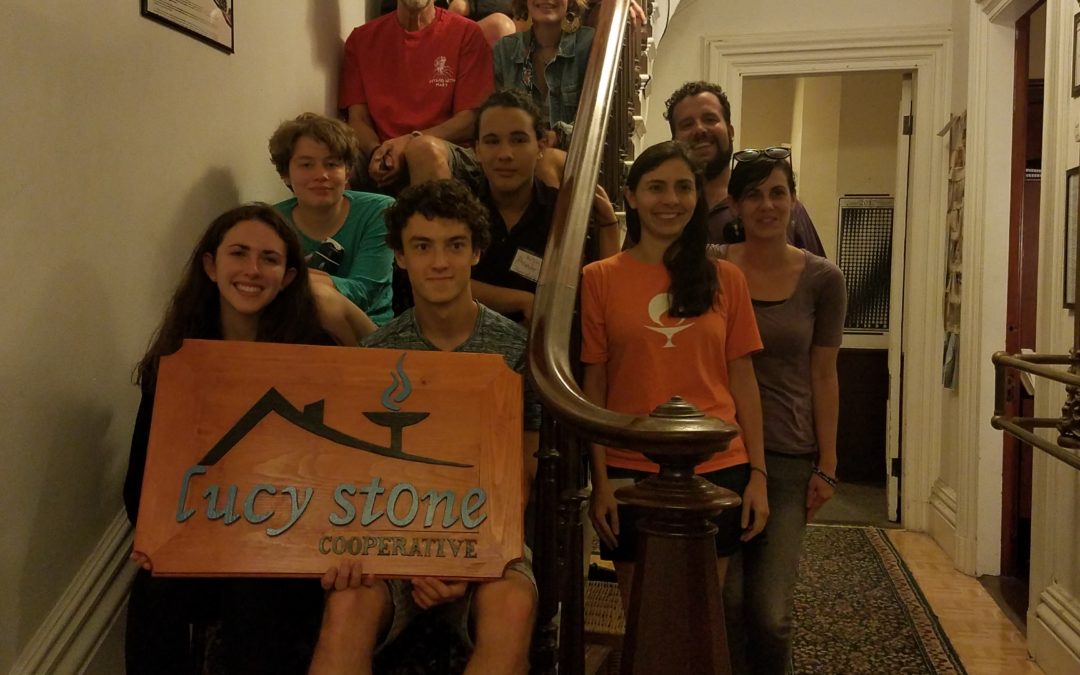
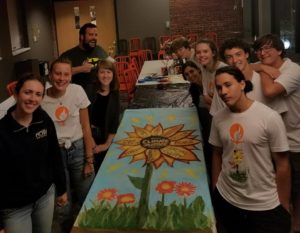
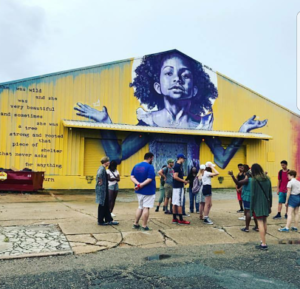
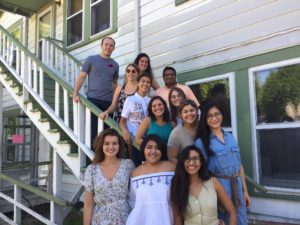

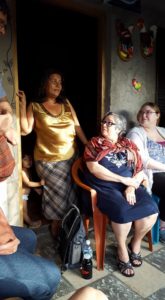
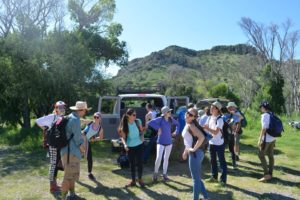
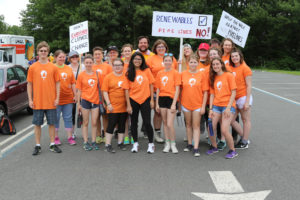
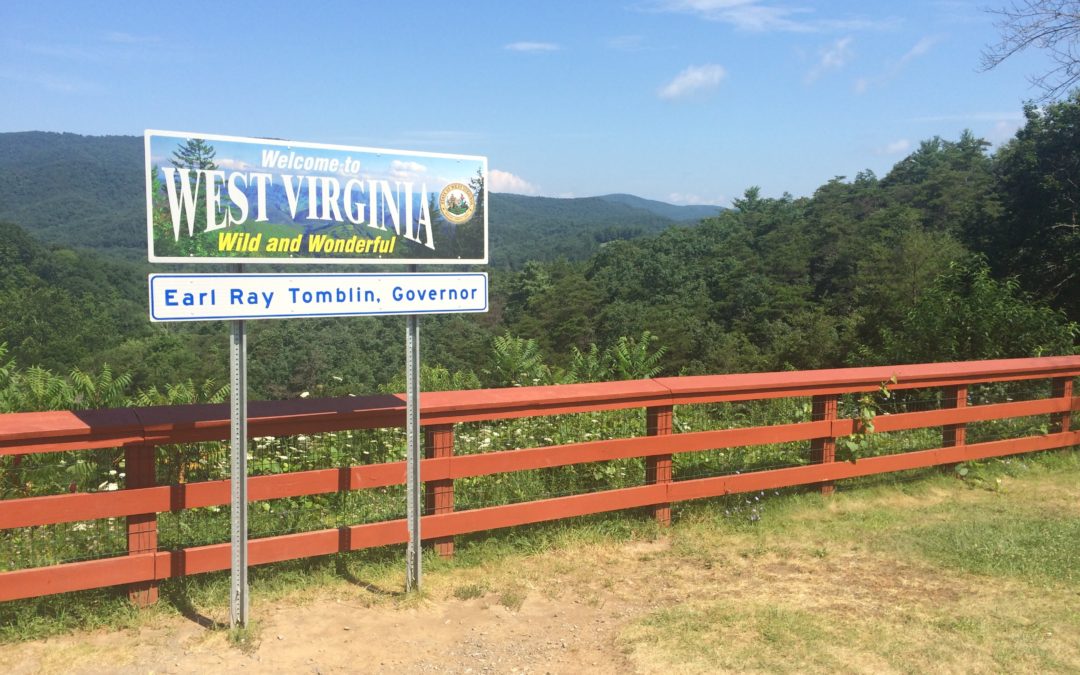
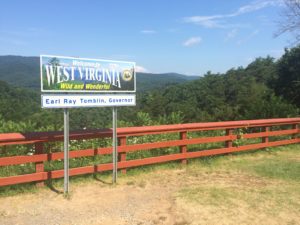 I have to admit, upon planning for this trip, I found myself feeling a range of emotions: intrigued, nervous, romanticizing. Like few other places in the country, West Virginia has come to stand for something very deeply entrenched in our national psyche. It has been heralded as the “home of coal,” and post-election we heard endless analyses of the state of the “white working class” and how on earth they could turn out in such large numbers for someone like Donald Trump. On the other hand, folks in West Virginia often refer to themselves as a “third world country” and as a “national sacrifice zone.”
I have to admit, upon planning for this trip, I found myself feeling a range of emotions: intrigued, nervous, romanticizing. Like few other places in the country, West Virginia has come to stand for something very deeply entrenched in our national psyche. It has been heralded as the “home of coal,” and post-election we heard endless analyses of the state of the “white working class” and how on earth they could turn out in such large numbers for someone like Donald Trump. On the other hand, folks in West Virginia often refer to themselves as a “third world country” and as a “national sacrifice zone.”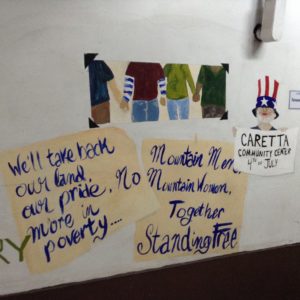 But there is another side I witnessed: West Virginia wasn’t always “white”, and wasn’t always poor, it has a long history of multi-racial activism led by the most affected (especially in coal mining unions), a long history of people fighting for dignity, diversity and sustainable development. And now, in the face of vicious inequality and environmental disaster, ordinary people are coming together to fight for their mountains, their water, their state and for their future.
But there is another side I witnessed: West Virginia wasn’t always “white”, and wasn’t always poor, it has a long history of multi-racial activism led by the most affected (especially in coal mining unions), a long history of people fighting for dignity, diversity and sustainable development. And now, in the face of vicious inequality and environmental disaster, ordinary people are coming together to fight for their mountains, their water, their state and for their future.